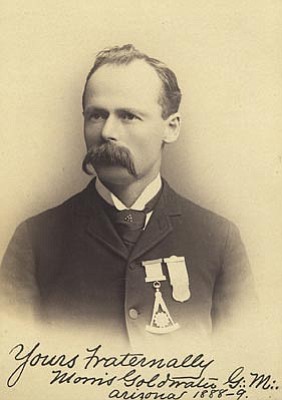By Dr. Ken Edwards
Brothers Michel and Joseph Goldwater escaped from Poland during the Russian persecution of Jews and immigrated to California in 1852. Their first business venture was a saloon in Sonora. When it failed, they moved to Los Angeles where they found their niche in the mercantile business, eventually peddling their goods to the goldfields of southern Arizona Territory.
Michel operated a store in La Paz and then Ehrenberg on the Colorado River before moving his interest to the new town of Phoenix in 1872. Michel and Joseph established a mercantile store in the Salt River Valley and Michel's son, Morris, joined them in the business. The business was unprofitable and the store was closed in 1875.Since they had freighting experience with their business, they were familiar with the Prescott area where they had often shipped supplies to Fort Whipple. Michel, now Michael, along with his son Morris, decided to try his luck in Prescott.
The move to Prescott in 1876 was a wise decision for Mike Goldwater. He was an experienced freighter and Prescott was in a somewhat isolated location. The railroad was coming east to southern Arizona Territory and would pass through Yuma rather than Ehrenberg. Although this would diminish the importance of Ehrenberg for goods headed to Tucson or Phoenix, goods headed to Prescott would likely still come through Ehrenberg. At Ehrenburg, the Goldwaters could keep a warehouse of supplies that could be freighted by wagons to Prescott as needed. Furthermore, there was agitation to return the capital to Prescott from Tucson, which actually happened the following year, thus elevating the status and needs of Prescott.
Howey Hall, on the southeast corner of Cortez and Goodwin (where City Hall now stands) was under construction when Michael Goldwater visited Prescott in the early summer of 1876. James Howey owned a blacksmith shop nearby and was building a modern brick building at this desirable corner location across from the Plaza. It was a great business site for a mercantile store and Mike quickly agreed to lease the two-story building upon its completion. The second floor contained a large multipurpose room, which was soon used as the meeting place of the first Masonic Lodge in Arizona.
Michael's son, Morris, arrived in town in late 1876 wiser after the business failure in Phoenix. His merchandising skills quickly built up the Prescott business. It was the Walmart of its time. As early as January 1877, the store advertised almost everything an early settler could want: cigars, ammunition, salmon bellies, canned goods, spices, ladies' underwear, wallpaper, furniture, hardware, barley "in quantities to suit," and more. A Fort Whipple newspaper ran an article on Oct. 23, 1876, in which they commented, "It is hoped that ... J. Goldwater and Bro., our new merchants, will soon put an end to ... the extortion inflicted upon the helpless people who are forced to make their necessary purchases in Prescott." Credit was liberally given, which led to many happy customers and not a few uncollectible debts.
Although Joseph Goldwater was the titular head of the company, Mike and Morris were the principal operators. Joe's involvement was minimal although he still apparently operated as purchasing agent for the business. In fact, until 1879 he had not even been in Prescott since 1872 when he was seriously injured in an Indian attack near Granite Mountain.
In May 1880, brothers Joe and Mike dissolved their partnership and the store was now given the name of Michael Goldwater and Son. The son, of course, was Morris. Joe left with a hefty settlement and moved on to Bisbee, Tombstone and other southeastern Arizona Territory communities where he established his own businesses. After many adventures and misadventures, he met an untimely death in Tombstone in1889.
Mike, often referred to as "Big Mike," was 55 years old when he came to Prescott, and Morris was 24. Most of the responsibility for running the store was left to Morris, who gradually morphed it into a primarily dry goods and ladies-wear establishment. Morris became an instant celebrity in Prescott. He successfully sold at lower prices than had prevailed in town and became an active participant in civic affairs. He also became active in fraternal organizations, particularly the Masons. He was a member of the Dudes hose-cart fireman's team. After only a little over two years, he was urged to run for mayor and won handily in the election of January 1879.
In less than three years, the Goldwaters were prosperous enough to build their own store. The lot on the southeast corner of Cortez and Union streets (present location of the First Baptist Church basketball court) was available, and Mike and Morris built their new Goldwater store there. It bore a close resemblance to Howey Hall, including a second-floor meeting place for the Masons. The new location was opened with appropriate fanfare in January 1880. Just a few months after opening, the building suffered damage from a fire in a dressmaker's shop next door. Despite a significant loss, the Goldwaters repaired the damage and continued in business.
Next week in Part III, extended Goldwater family involvement in the Prescott store, as well as other business, social and political interests of the family.
Sharlot Hall Museum/Courtesy photo
Morris Goldwater, shown here in an 1888 portrait, was a merchant, mayor, statesman and Prescott’s 1964 “Man of the Century.”



